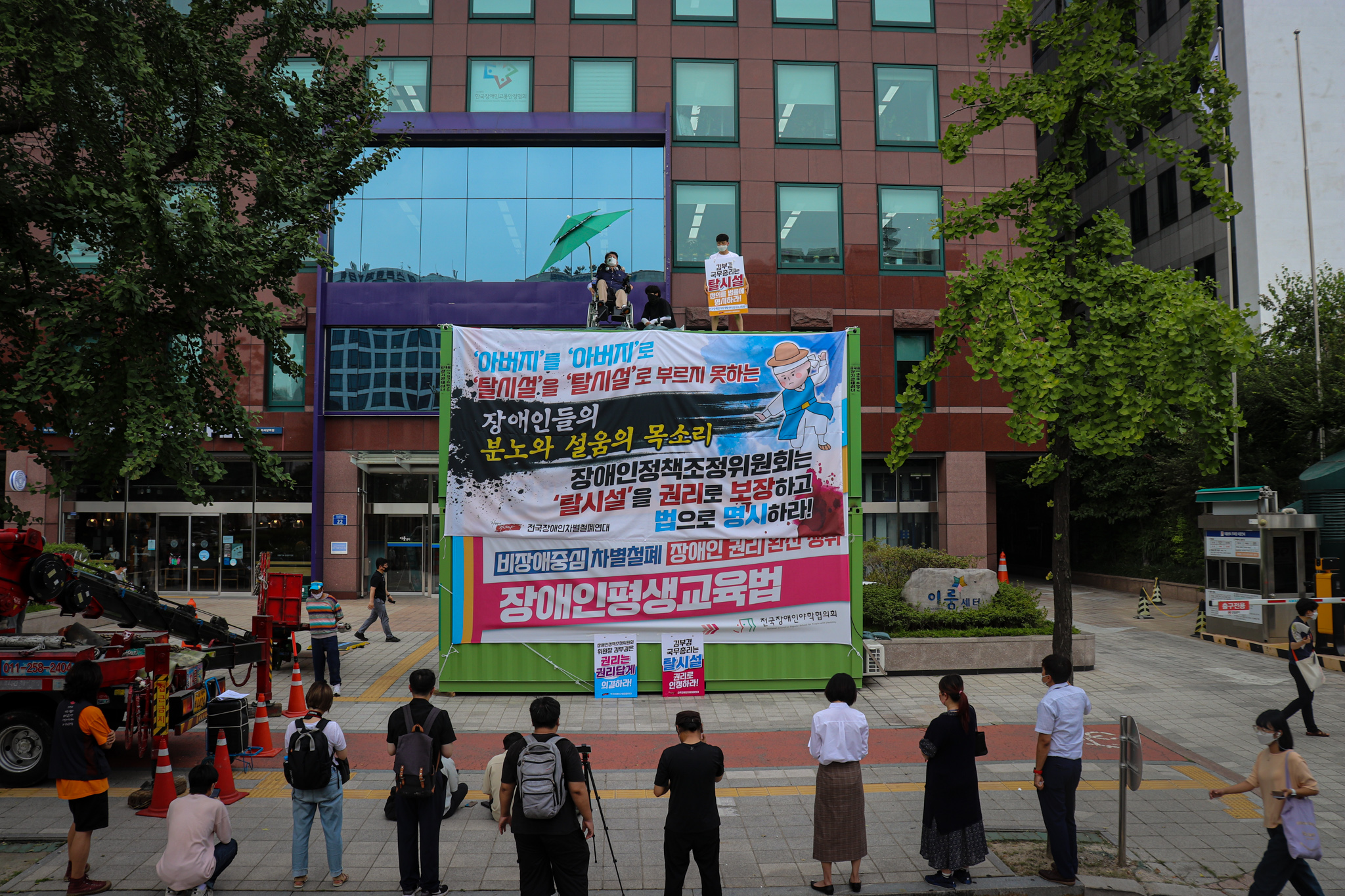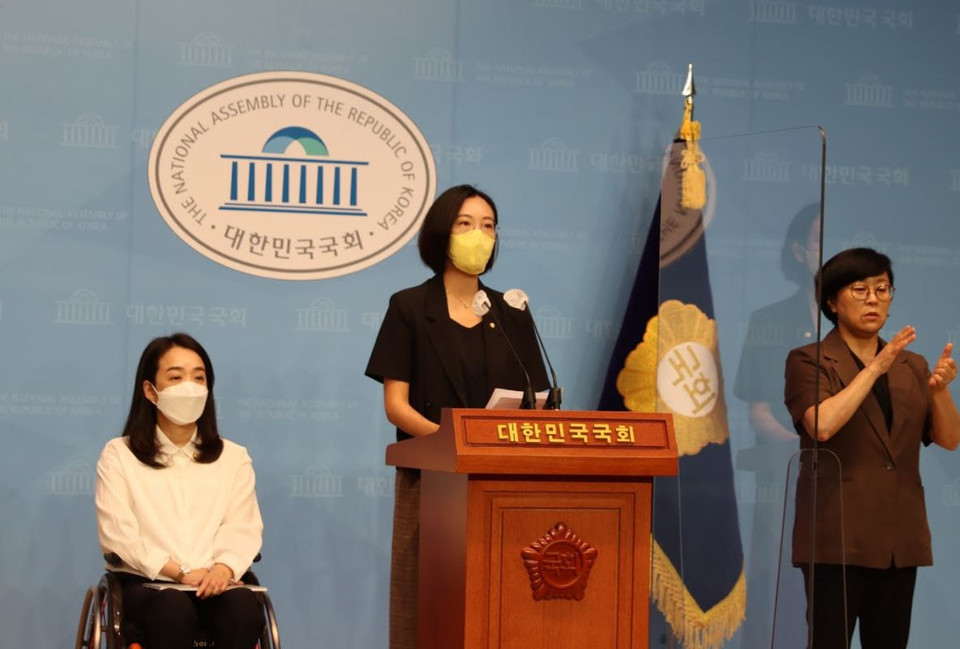The first Deinstitutionalisation Roadmap by the ROK government turned out to be a deceptive ‘institution transform plan’

On July 29, Korean DPOs started demonstration demanding right-based deinstitutionalization roadmap. photo: SADD
On August 2, the Korean government announced the Deinstitutionalisation Roadmap. It is a significant milestone as the government declared its first deinstitutionalisation policy. It is also desirable that the government has demonstrated its commitment to banning new establishment of institutions, introducing one strike-out system that immediately closes institutions where human rights violations occur, implementing an annual survey on independent needs of the residents in institutions and providing housing services.
Institutions will survive
However, as exact as the disability community was concerned, the main focus of this roadmap is 'transforming institutions'; the concept of deinstitutionalisation is misplaced. The government has set the completion of the deinstitutionalisation in 2041. The government said that it will provide a 'Special Supporting Facility' for the disabled people who need 24-hour support and joint housing(group home) even after the year 2041, but these residential options are surely institutions. As a result, 17,775 people will still live in institutions in 2041 and 59% (15,517) of them will be absorbed into group homes and 12.3% (2,193) of the most severely disabled people who need 24-hour support will remain in institutions.
It is hard to find details in the roadmap such as expanding 24-hour personal assistance services, subsidy for resettlement, and budget for housing. Rather, it said it would allow people with disabilities who need 24-hour care to enter the institutions, increasing the possibility that the institutions will function as a 'colony' of persons with severe impairments.
Deinstitutionalisation become 'privilege to certain group', instead of 'Universal rights'
The roadmap gives priorities to the residents who have a "desire" for deinstitutionalisation. The residents in short-term and group homes are excluded from asking their "desire". Let alone the fact that the people living in institutions cannot have 'desire' to deinstitutionalisation for various reasons, asking desire means that the government still consider deinstitutionalisation as a privilege, not a universal right.
According to the plan, only 5,452 people will move from institutions to personal houses in the community from 2025 to 2041. This accounts for only 18.7 per cent of the 29,086 people currently residing in the institutions. Considering that the average length of residence in institutions is 18.9 years and the average age of the residents in institutions is 39.4 years, a 20-year deinstitutionalisation plan is too slow. It means that some of the persons in institutions have to wait another 20 years in institutions to realise the right to live in the community.
"Nothing about Rights without Budget."
The newly announced deinstitutionalisation roadmap also deceives that the roadmap will dramatically change the lives of the disabled without increasing the budget needed to realize it. It is hard to find information on how much personal assistance service will be expanded including for those who need 24-hour care, how much subsidy for resettlement will be secured, and how much housing will be provided.
Criticism against the Roadmap
Solidarity Against Disability Discrimination(SADD) criticised the roadmap that it is "Too late, too irresponsible, and too slow." SADD said that "Moon Jae-in administration corrupt the concept of deinstitutionalisation, which is ensured in UN CRPD, by keeping the isolation and exclusion of persons with disabilities."
Korean Parents' Network for the People with Disabilities also expressed their anger as "the 'Deinstitutionalisation Roadmap' of the government is read 'commuitisation of institutions'." The parents' network also criticised that "a deinstitutionalisation roadmap based on the shabby supporting system, which cannot secure the needs of persons with intellectual disabilities, will be collapsed at any moment" and "the roadmap will only lead to a monster called 'communitised institution'."
FootAct, a deinstitutionalisation advocacy organisation, said, "We express serious concern about the government's announcement of a roadmap focusing on the conversion of institutions, rather than persons inside."
Legislation of deinstitutionalisation is a further task

Rep. Hyeyoung Choi(left) and Rep. Hyeyoung Jang(middle) held a press conference and criticised the roadmap by the government
On 10 December 2020, a Deinstitutionalisation Support Act bill was proposed in the Republic of Korea with support from 68 lawmakers including lawmaker Choi Hyeyoung and Jang Hyeyoung(Yes, they have the same name!). The law consists of two main parts; closing all forms of institutions in Korea and supporting the resettlement of persons with disabilities.
Rep. Choi Hye-young and Rep. Jang Hye-young, who co-proposed the law, held a press conference on the 3rd of August.
Rep. Choi Hye-young said, "The roadmap defined 'deinstitutionalisation support' as a 'series of support policies to transform institutions, which can be misleading. The purpose of deinstitutionalisation policy should be the full realisation of the right to independent living in the community as engraved in the UN CRPD," she criticized. "Deinstitutionalisation is not a matter of choice, but a fundamental right. Regardless of the type and degree of disability, we should actively guarantee the rights of all disabled people."
Rep. Jang Hye-young also said, "There is no "right" in the deinstitutionalisation plan by the government. Although institutions were presented as one of the options of housing that disabled people can choose, deinstitutionalisation is not a choice of housing, but a right to live with choices," she said. "It was a compulsion, not an option, for many disabled people to get into the institutions in the first place, but it doesn't make sense to figuring out their desire when they come out. We must legislate deinstitutionalisation as a right."
 P4G Civil Society Forum (2021.5.14)
P4G Civil Society Forum (2021.5.14)


